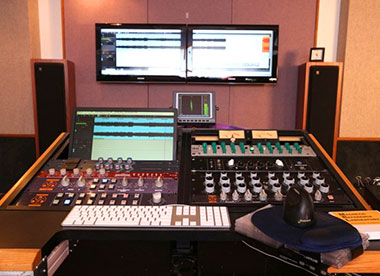
|
|
|
|
|
What
is Mastering? What is Mastering? Audio Mastering is not about signal processing or the equipment that is used. In short, it's about making judgment calls to improve or retain the quality of the clients mix's and to compose/assemble all of those mix's into a cohesive smooth listening experience for the end user on most types of playback systems. To achieve this consistently, the mastering engineer has to know the sound of their listening space and how it translates to real world play back systems,to react to first impressions and act objectively using the highest quality equipment that will assist in executing the deciding judgments made. Making sure there is a line of communication to the client is as critical too. There are three stages of producing a record. CD Mastering is the 3rd & last stage using an objective view for the technical aspect and a subjective aspect that coordinates with the clients vision. |
 |
When assembling a CD for replication/duplication further details need to be addressed. Songs need to be sequenced in the right order, with the appropriate spaces between them, with natural sounding fade-ins and outs or cross fades and with a consistent output level. Every project is different and all work is customized to the clients needs. Ed looks at this process as if he is composing the album – as if it were his own music that needs to flow smoothly so the listener is subconsciously engaged all the way to the end (of course
your music will get the listeners attention anyway right?). |
|
Why
use Ed Littman Mastering? With Ed’s varied musical performance background and diversified Mastering credits, he knows what most styles of music and instruments should sound like. He’s a trained musician, not just an engineer that truly enjoys creating a better sound for his clients and has the knowledge & equipment to do so. Our facility is specifically designed for CD Mastering and post production by the legendary George Augspurger. The equipment used is some of the best analog & digital gear made. Analog mastering is our main approach to our workflow, our custom gear assists in our mastering decisions to achieve the clients vision and allow the listener to connect deeply with the music. |
 |
 |
 |
How
to be prepared for the mastering process? It is recommended to only use a compressor on your mix down only if it creates the sound that you are looking for not for loudness. One of the best methods for retaining the punch and dynamics of your original mix, and minimizing distortion are to make sure all transients (snare, cymbal crashes) are no louder than -3dbfs (this means without compression or limiting nothing should hit the digital zero). With that said….We'll work with anything you send. |
|
 |
For Non attended/Emastering sessions, if there are any details, issues, or concerns about any of the mixes feel free to email that information along with the final song order & desired spacing times between songs. You can always leave the song spacing up to us, just let us know. Call Us.... It's always a pleasure to speak to our clients on the phone at any stage of the process. We also have professional tape machines that play 1/4 inch and 1/2 inch tape formats at tape speeds of 1.7/8, 3.3/4, 7.1/2, 15, and 30 IPS. If you are sending mixes on Tape, please include the test tones of 50hz, 100Hz, 1khz, 10khz, 15khz, from the same machine you are mixing from. When shipping vinyl, please make sure you properly insure and pack your records. The sender is 100% responsible for a safe delivery. |
What
should you expect from your finished master? Today the mastering engineer has much more room for a creative role in the final sound of a master. At Ed Littman Mastering we feel that our responsibility is to make sure that the client's mix will translate well to all playback systems and to create a finished sound. Unless discussed with the client, our goal will never be to change the final mix, but only to enhance it if needed. The effects of mastering differ from mix to mix - it can be a huge WOW! improvement that is instantly obvious, or there may be subtle enhancements that standardize the mix over different speaker systems. It all depends on the quality of your mix and your goals. If you are not happy with your mix before the mastering stage it is advised do a remix with some one who knows what they're doing. If a remix is not possible we can then use surgical methods to address challenging problems. With our custom & tube analog gear your mix will sound warmer and more dimensional. Our analog Equalizers can create shimmering highs without being harsh, and lows that are round and punchy without being muddy. Our high end analog compressors can add the mid range punch and thickness that may be missing in a digital recording. We can make your bad mix sound better and we can make your good mix sound great! It is also important to realize that mastering is not just using equalizers, compressors, and getting your master loud, but it is the process of making critical judgment calls about your mix with a fresh perspective in an acoustically accurate environment. Mastering is the art of using restraint and subtlety while possibly making a huge difference to your music. It is also the craft of having your vision realized so the listener gets the emotional connection from your music as intended. |
 |